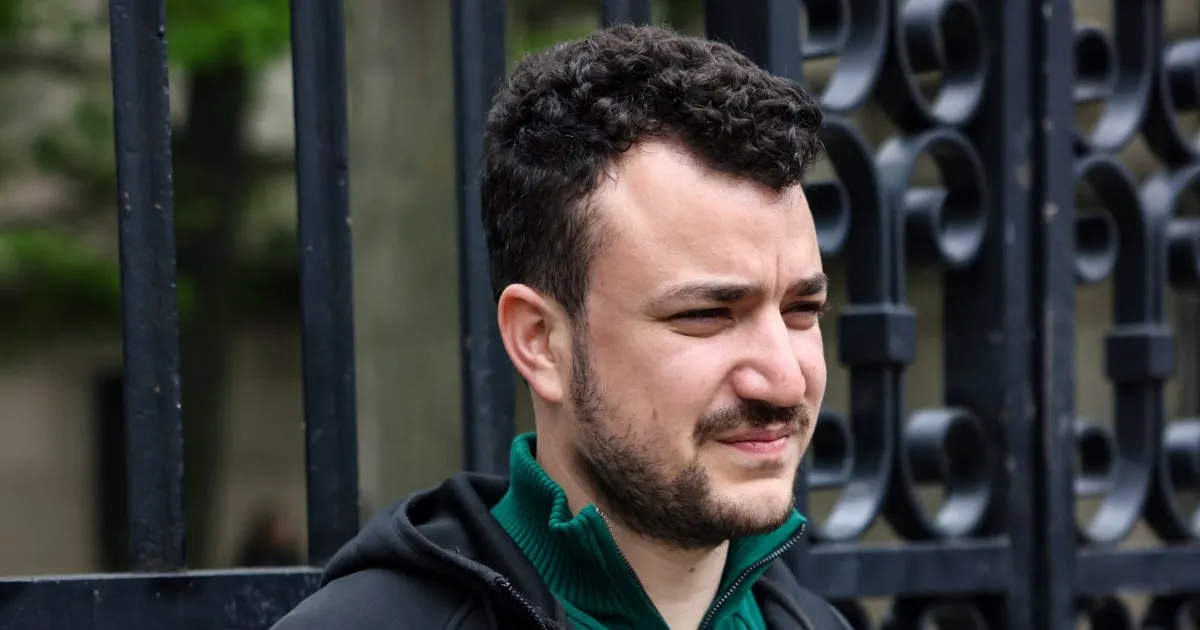
Mahmoud Khalil, a pro-Palestinian activist and graduate student at Columbia University, is currently facing deportation after a contentious arrest last month. According to court documents released on Thursday, Khalil was detained without an arrest warrant, raising significant legal and ethical questions surrounding his case. The details of his arrest reveal a complex interaction with federal immigration authorities that has garnered widespread attention.
Khalil, a Syrian-born legal resident and green card holder, was apprehended on March 8 after returning home from an Iftar meal during Ramadan. The Department of Homeland Security (DHS) attorneys claim that immigration officers had "exigent circumstances" justifying the warrantless arrest. They indicated that Khalil expressed intentions to leave the scene and would not cooperate. However, video evidence contradicts this assertion, showing Khalil cooperating with the officers and stating, “Yes, I’m coming with you.” Currently, he remains in custody at an immigration detention facility located in Louisiana.
In the aftermath of his arrest, Khalil's wife, Noor Abdalla, publicly disclosed that ICE agents informed her they had a warrant to revoke his student visa. However, when she pointed out that a warrant was unnecessary for such an action, they shifted their claim to revoking his green card. This discrepancy raises questions about the procedures followed by immigration authorities during Khalil's arrest.
The DHS maintains that they were justified in conducting a warrantless arrest, arguing that immigration officers have the authority to detain individuals suspected of committing offenses against the United States. They claimed that the supervisory agent from Homeland Security Investigations (HSI) deemed Khalil a flight risk, thus necessitating the immediate arrest. This notion of flight risk is further supported by assertions that Khalil might have escaped before a warrant could be procured.
Khalil's legal team argues that the DHS did, in fact, require a warrant to enter his apartment building and that he consistently cooperated with authorities during the arrest. His attorneys are requesting the dismissal of the case, highlighting that no substantial evidence has been presented to substantiate claims of flight risk. “We learned for the first time that the DHS agents who arrested Mahmoud lied to him,” stated Marc Van Der Hout, one of Khalil’s attorneys. He further explained that the agents falsely claimed to have an arrest warrant, which the DHS later admitted was untrue.
The Department of Justice and ICE have not yet responded to requests for comment regarding Khalil's situation. Meanwhile, Assistant Secretary of DHS, Tricia McLaughlin, stated in an email that Khalil was identified as a removable alien and was arrested when he attempted to walk away from ICE officers. Khalil's case has attracted international scrutiny, particularly as the Trump administration intensifies efforts to deport students linked to organizations labeled as foreign terrorist entities, such as Hamas, often without presenting evidence.
Documents released recently indicate that Khalil has submitted an asylum application following an immigration judge's ruling allowing for his deportation. The government has cited two grounds for his removal since his arrest in New York City. Initially, they referenced a provision that permits the Secretary of State to deport individuals deemed to pose serious adverse foreign policy consequences for the U.S. The second ground, disclosed on March 23, alleges that Khalil failed to disclose pertinent information regarding his affiliations and employment history in his permanent residency application.
Khalil's attorneys have submitted additional evidence to counter the allegations of antisemitism, including letters from various Jewish classmates and professors at Columbia University who attest to Khalil's positive actions, such as condemning Hamas and supporting Jewish students on campus. His legal team has also refuted claims that he misrepresented his employment history on his residency application, asserting that these allegations are based on unverified tabloid reports.
Thursday's court filings were submitted in response to a deadline set by the immigration judge overseeing Khalil’s removal case in Louisiana. In a separate federal case, Khalil is seeking bail and a preliminary injunction to secure his release from custody while his immigration proceedings continue. His asylum application remains sealed due to the sensitive nature of the information involved, as confirmed by his legal team.
As the situation develops, Khalil's case highlights significant issues surrounding immigration enforcement practices and the rights of individuals facing deportation in the United States.